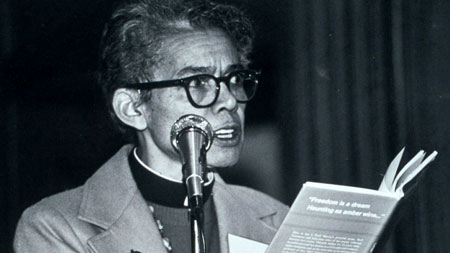Documentary Film (2021)
Directed by Julie Cohen, Betsy West
Written by Talleah Bridges McMahon, Julie Cohen, Cinque Northern, Betsy West
Amazon Studios/ Amazon Prime
Film Editing by Cinque Northern; Music by Jongnic Bontemps

Photo: RCWMS
Born a black woman in 1910, Pauli Murray was an intellectual giant and a relentlessly dedicated activist. Thirteen years before Rosa Parks became famous for defying the segregation rule in a bus in Montgomery, Alabama, which eventually led to the Montgomery bus boycott, Pauli Murray and a friend had done the same in a bus in Virginia. They were arrested and jailed briefly for it, but the action never made the news.
Murray was talented and capable and decided that, to find the tools to fight racism, she would get legal training. She went to Howard University Law School at a time when very few women did and graduated at the top of her class. At the time, the top graduate from Howard was honored with an acceptance to Harvard University Law School to get an advanced law degree. However, because Murray was a woman, the offer was rescinded. She was offered an opportunity somewhat later to attend Yale Law School for an advanced degree.
Somewhat miraculously, in the 1950s Murray was offered a position in the prestigious New York law firm Paul, Weiss, Rifkind and was the only black person and one of very few women in the firm. She stayed a few years, and made one of her most important personal connections, with office manager Irene Barlow, who became, for Murray, a life partner in an age before such relationships were publicly acknowledged. Out of frustration with the state of racism in the United States, Murray left her position at Paul, Weiss and sought a teaching position at a law school in Ghana, where she remained for a couple of years.
Murray had always been outspoken, and somehow, by writing insistently to FDR at the time of his presidency about racism and the plight of women, and to First Lady Eleanor Roosevelt, she became good friends with the First Lady. Later on, Murray was associated with Betty Friedan, the founder of the National Organization of Women, and was very much involved with the initiation of the modern women’s movement in the United States.
In addition to being an advocate for women’s rights, and, as well, attracted to women in a personal way, Murray also exhibited the disposition of a sexually non-binary person. She wondered whether she might have biologically-based sexual ambiguities, and due to the general non-recognition of her non-binary sexual self-identity, suffered psychological challenges as a result.
In the early 1970s, Irene Barlow died, and Murray, bereft, decided to act on her impulse to realize an important feature of her life which she particularly shared with Barlow, her interest in and devotion to her Episcopalian faith. She took training as an Episcopal priest, and did, in fact, become one of the first women in the Episcopal Church to attain to that status.
This superbly done film give a richly detailed account of Murray’s complex and fascinating life while, giving, through original footage of her, a good feeling for who she was personally. Commentaries and contributions by Murray’s grandniece and by several scholars fill out the picture nicely. The history of Murray’s life is told effectively and, with deft editing, the story from Murray’s point of view and from that of those who speak about her legacy are seamless. Additional features, like the added original music by Jongnic Bontemps, is also highly effective.
Near the end of the film, a group of students at Yale are shown discussing Murray’s legacy. They sit in a room at Pauli Murray College, one of Yale’s residential colleges named in 2017 for Murray, the only Yale residential college named for a person of color and for one identified as LGBTQ.
Filmmakers Julie Cohen and Betsy West, who previously had collaborated on the excellent RBG (2018) about Ruth Bader Ginsburg, have provided another informative and compelling portrait of a greatly accomplished person of color who was a pioneer in all kinds of areas including that of sexual identity and fluidity.
– BADMan (aka Charles Munitz)
Leave a Reply